Physical Address
304 North Cardinal St.
Dorchester Center, MA 02124
Physical Address
304 North Cardinal St.
Dorchester Center, MA 02124

The parents of four young women’s Israeli hostages who got rid of the Gaza Hamas captivity told the BBC how they abused their daughters, including starvation, intimidation and threat of armed men, and forced to cook and clean.
It was said that the hostages were kept in underground tunnels and buildings, physical abuse, and made it to participate in the videos of Hamas propaganda, including his own death.
It was said that women found strength by sharing stories, drawing and holding the diary.
None of the women have given the media interviews since their release, and their parents still have full details. There are also things that they can’t talk about about fears that hostages can continue to endanger the hostages in Gaza.
Three of the four women whose parents spoke to the BBC were kidnapped by Hamas from the Nahal Oz army base near Gaza on October 7, 2023.
Access to hostages to food and their treatment by male guards changed over the 15 months, their parents said. They were moved between the places, rarely seeing sunlight.
“It is very different between the places where he left – maybe a good tunnel, a very bad tunnel. It may be a good or bad house,” said Agam Berger’s father, a 20 -year -old soldier, a soldier, a soldier. who were at Nahal Oz.
Some places had good food, some of them had very bad food … they just tried to survive, “said Shlomi Berger.
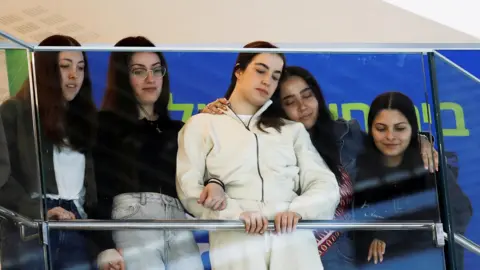 Reuters
Reuters“They (and prisoners) had to escape from one place to another because they were in a war zone. It was very dangerous to be there,” said Orly Gilboa, whose daughter, Daniella, was also kidnapped.
When Daniella watched the Release of three men’s hostages last week “Who’s thin and exhausted,” he said to his mother, “If he had been released two months ago, he would probably have looked like them.”
“It has become thinner, losing a lot of weight through captivity. But in the last two months they have received a lot of food for weight loss,” says Gilboa.
Other parents also meant significant weight loss. Meirav Leshem Gonen’s daughter was taken by Hamas from the Nova Music Festival.
The 24 -year -old Romi was released in January in the first week of a ceasefire – he lost 20% of his body weight, “says his mother.
According to Mrs Gilboa, the hardest thing she tolerate was seeing a video that suggested that her daughter had been killed. Inmates were poured dust on it, so it looked like it was plastered, as if he had been killed in an Israeli military strike.
“I think everyone who saw it, believe it, but I just told myself it couldn’t be,” he told the BBC.
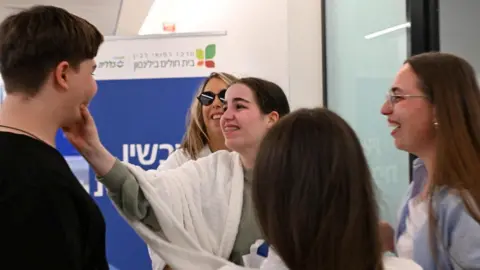 GPO/Reuters
GPO/ReutersThe war was launched by an unprecedented attack on Hamas on October 7, 2023, when the weapons killed about 1,200 people and took another 251 hostages.
According to Hamas’s Ministry of Health, more than 48,30 people were killed in Gaza. Gaza buildings approx. Two -thirds were destroyed or injured, estimated by the UN.
So far, 16 Israeli and five Thai hostages have been replaced with more than 600 Palestinian prisoners held in Israel during a ceasefire began on January 19th.
According to Mr Berger, his daughter Agam was threatened by detainees and captured by physical abuse.
“Occasionally other female hostages have been tortured in front of her eyes,” he says, specifically what Soussana, the former hostage, which was released in November 2023.
Mr Berger tells her daughter telling her that armed men were constantly watching them, “playing their weapons and their hands with their grenades.”
He says that male prisoners treated women with “great disrespect”, including forcing them to clean and prepare the food.
“It really bothers her. A girl who has something to say will say. She’s not shy. And she sometimes told them what she thinks of them and their behavior,” he says.
He adds that in a small act of resistance, Agam refused to do the jobs on Saturday. Detecting men accepted this.
They didn’t let them speak loudly.
“When Agam came (back to Israel), he wanted to speak constantly … After a day he didn’t have a voice because he spoke so much,” says Mr Berger.
Yoni Levy, whose daughter, Naama, also comes from the army base, says she was sometimes kept in places where there was TV or radio.
Once, Naama saw her father talking on TV. “He has given him a lot of hope and optimism … that no one will forget him and we will do everything that is needed to take him out of this hell.”
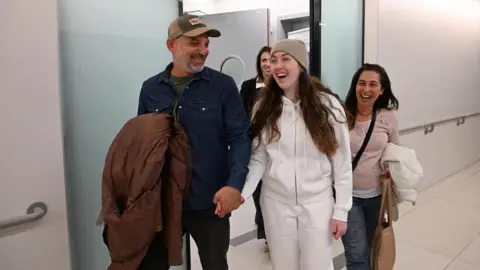 Gpo
GpoHe says that because of Naama, the Hamas attack on the army base was “much more traumatic than captivity itself.”
“It may change, but at this stage we think this is the most common day he talked about,” says Mr Levy.
Naama’s shots show that day that she and other female soldiers are in blood -painted clothing surrounded by armed men in the same room before being forced into a vehicle and taken to Gaza.
The three female soldiers whose parents spoke to the BBC five at Nahal Oz, Nahal Oz Freed in the first round of fire.
Members of the unit, known as Tatzpitaniyot in Hebrew, observing the Gaza border and seeking suspicious signs. Survivors and relatives tell some people that day they have been warned for months that Hamas was prepared for the attack.
A few days before the October 7 attack, Daniella was at home from service. Then he said to his mother, “Mummy, when I go back to the army, there will be war.”
“I didn’t think it would be such a war, and of course my daughter would take it hostage,” says Gilboa.
Ms. Gilboa and the BBCs spoke to two observers’ families say they are joining what happened.
It is said that their daughters continue to worry about the Gaza, which is still called upon to continue the ceasefire.
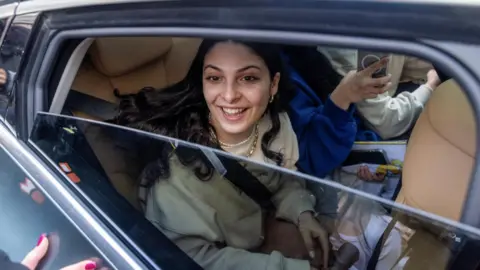 Reuters
ReutersMeanwhile, Leshem Gonen says she’s still learning what happened to her daughter Romi.
He was shot at the Nova Music festival and his mother says he was not treated properly and left with an open wound where he saw the bone. “
“It’s something we know and talk about it. The other things, I think it takes time.”
According to Mrs Leshem Gone, Romi described her release as “intimidating” and “scary” in the first week of the ceasefire. It was surrounded by weapons and masses. But the moment of their encounter was “so huge”.
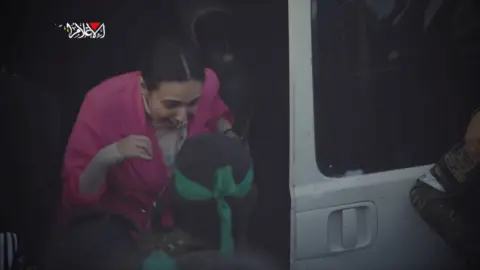 Reuters
ReutersParents also described how their daughters found a way to get in captivity every day – by drawing, making notes or sharing stories.
“Everything was written as much as they could, every day – what happened, where the guards and similar things were,” says Mr Berger.
Keeping in captivity, young women dreamed of the things they got home when they got home: hairdressing and sushi.
Daniella pulled a butterfly in the word “freedom” in captivity – now she was tattooed on her arm.
In Israel, they adapt to life and, according to their families, step by step to recover.
According to Mr. Levy, he was still blurred at the time of meeting his daughter Naama, but remembers the emotions.
“The feeling was that … I’m going to take care of you now and everything would be fine. Dad is here. It’s all. And then everything was quiet.”
More reports: Naomi Scherbel-Ball
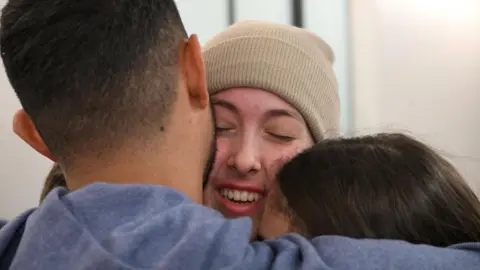 Reuters
Reuters